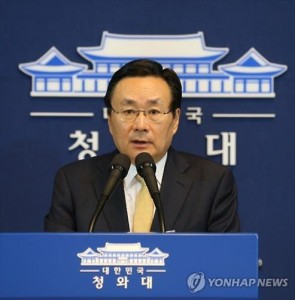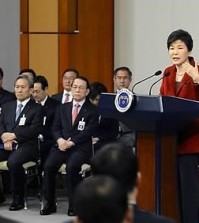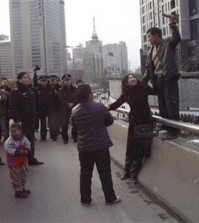- California Assembly OKs highest minimum wage in nation
- S. Korea unveils first graphic cigarette warnings
- US joins with South Korea, Japan in bid to deter North Korea
- LPGA golfer Chun In-gee finally back in action
- S. Korea won’t be top seed in final World Cup qualification round
- US men’s soccer misses 2nd straight Olympics
- US back on track in qualifying with 4-0 win over Guatemala
- High-intensity workout injuries spawn cottage industry
- CDC expands range of Zika mosquitoes into parts of Northeast
- Who knew? ‘The Walking Dead’ is helping families connect
President Park to attend China’s celebrations of 70th anniversary of end of WWII

Ju Chul-ki, senior presidential secretary for foreign affairs, announces President Park Geun-hye’s visit to China next month to attend its celebrations of the 70th anniversary of the end of World War II during a briefing to reporters on Aug. 20, 2015. (Yonhap)
SEOUL (Yonhap) — President Park Geun-hye will make a three-day visit to China next month to attend its celebrations of the 70th anniversary of the end of World War II, a senior official said Thursday, in the latest move that could highlight Seoul’s deepening ties with Beijing.
Park will leave for China on Sept. 2, a day before China holds its war anniversary ceremony in Beijing, Ju Chul-ki, senior presidential secretary for foreign affairs, told reporters.
Park could hold summit talks with Chinese President Xi Jinping, Ju said, though it remains undecided on whether Park will attend a military parade in Beijing that is expected to highlight Japan’s surrender in the war.
“Consultations are under way between South Korea and China to work out the details” of Park’s trip, Ju said.
In a press briefing later in the day, Foreign Ministry spokesman Noh Kwang-il said Park and Xi are expected to hold a summit this time, although the two countries are still in consultations over the details of her schedule.
Park’s decision is the latest in a series of moves that underscore her commitment to further boosting ties with China, South Korea’s largest trade partner.
South Korea and China are former battlefield foes as China fought on North Korea’s side against South Korea and the U.S.-led U.N. forces in the 1950-53 Korean War, which ended in a ceasefire, not a peace treaty. South Korea and China have steadily improved ties since establishing diplomatic relations in 1992.
U.S. President Barack Obama will not attend the Chinese anniversary event as Washington views it as a display of Beijing’s growing military might.
Speculation had been rife that South Korea was weighing its attendance at the ceremony on concerns it may upset its ally the U.S.
Government officials here said the two sides consulted enough on Park’s visit.
“It was fully, sufficiently communicated with the U.S. in advance,” said one official, who spoke to Yonhap News Agency on condition of anonymity. “We fully explained our position and considerations, and the U.S. fully understood.”
Another official said, “As allies, South Korea and the U.S. constantly hold dialogue on nearly all issues. We closely communicated with the U.S. this time as well.”
The U.S. has denied a recent Japanese media report that Washington voiced opposition to Park attending the Sept. 3 ceremony in Beijing over concerns it could send a false message to the world that China has cracked the U.S.-South Korea alliance.
Some critics claim that South Korea may be tilted toward China, but South Korea has said it is seeking to boost ties with both the United States and China.
Park has recently dismissed as “defeatism” the deeply held notion among some South Koreans that describes the country as a shrimp whose back could burst open in the middle of fighting whales, referring to the growing rivalry between the U.S. and China.
The trip will also take Park to Shanghai to attend a ceremony to reopen a historic building that was used by Korea’s provisional government during Japan’s 1910-45 colonial rule of the Korean Peninsula.
Many Koreans moved to China to continue the anti-Japanese resistance movement during the colonial rule.
The provisional government was formed on April 13, 1919 as the Korean government-in-exile, a month after Korea launched an independence movement against Japan. The Korean Peninsula was later divided into the capitalistic South and communist North after its independence from Japan in 1945.
















